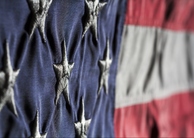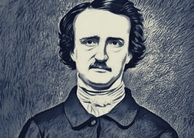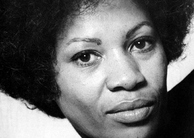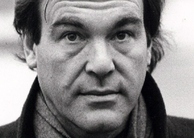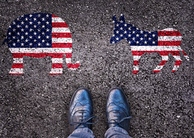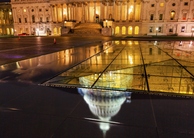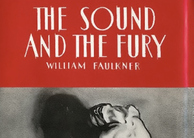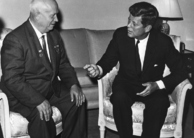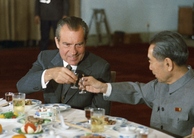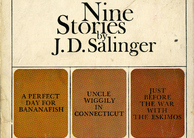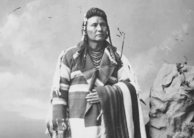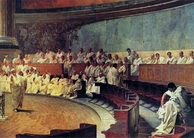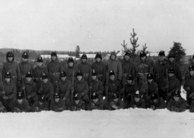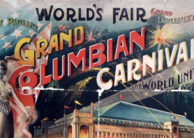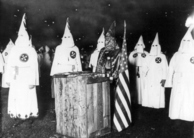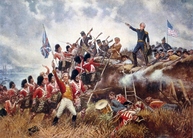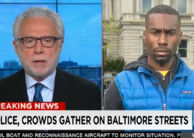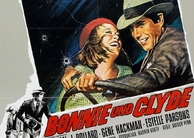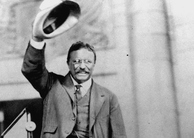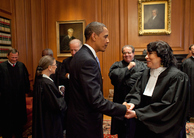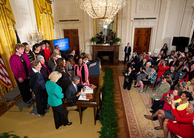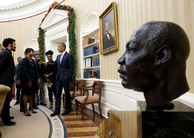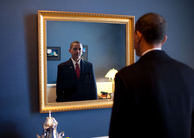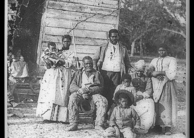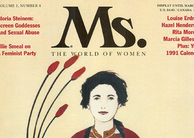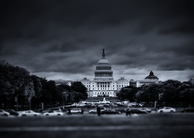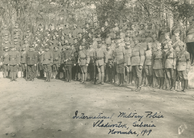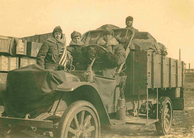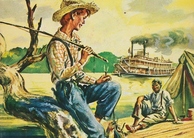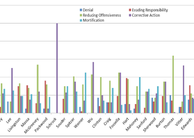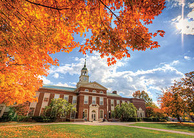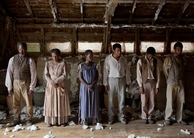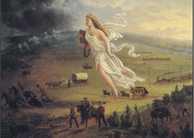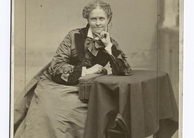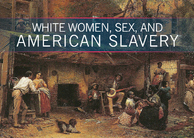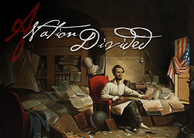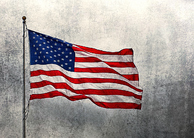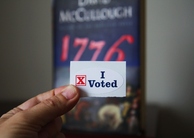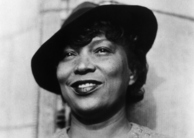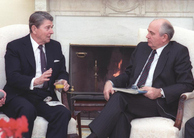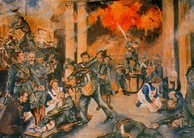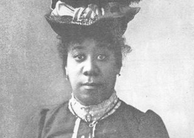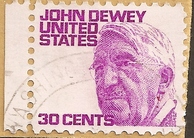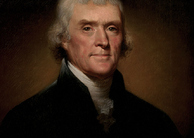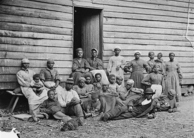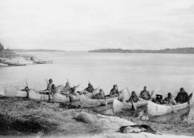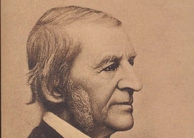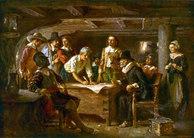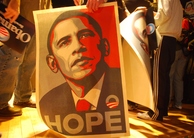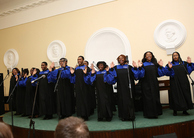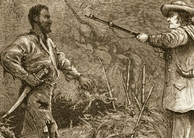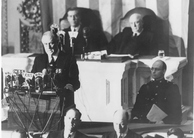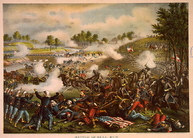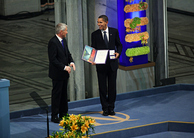|
American (tagged articles)
The keyword American is tagged in the following 188 articles.
2022, Vol. 14 No. 09
The Goldfinch (2013) by Donna Tartt is a novel that explores the conditions of grief and escalating lengths characters will go to survive the traumas and mysteries of life. This story of guilt and loss—intermixed with love and longing&mdash... Read Article »
2022, Vol. 14 No. 06
Two of the most prevalent protest movements in recent history were the Black Lives Matter and the #StopTheSteal movements. While there are many differences between the two, one of the most prevalent is their use of violence. Whereas the BLM movement... Read Article »
2022, Vol. 14 No. 04
During the summer of 2020, two fatal shootings occurred following Black Lives Matter protests. The first event involved Kyle Rittenhouse in Kenosha, Wisconsin, and the second Michael Reinoehl in Portland, Oregon. Two shootings, each committed by... Read Article »
2022, Vol. 14 No. 02
The Fourth Amendment protects the “right of people to be secure in their persons, houses, papers, and effects, against unreasonable searches and seizures…” Fundamentally, the Fourth Amendment places constitutional limits on law... Read Article »
2022, Vol. 14 No. 02
Numerous studies have investigated why women are vastly underrepresented in prisons across the United States. In explaining this “gender gap,” scholars have found that women are treated more leniently than men at various stages of the... Read Article »
2022, Vol. 14 No. 01
Was the selection of Donald Trump in the 2016 Republican Primary a strategic or a substantive choice? Donald Trump defied many predictions when he won the GOP’s presidential nomination despite his initial ‘underdog’ standing and... Read Article »
2021, Vol. 13 No. 12
This thesis explores the inherent conflict between liberty and equality—the twin pillars on which the United States and its Constitution are predicated—and the materialization of this conflict in storm center texts, whose subjects cover... Read Article »
2021, Vol. 13 No. 12
Political polarization has been an increasingly salient point of discussion since the 2016 presidential campaign, the election of Donald Trump, and into today. Beyond emphasizing partisan and issue-based divides, scholars have identified emotion... Read Article »
2021, Vol. 13 No. 11
While the Cold War is popularly regarded as a war of ideological conflict, to consider it solely as such does the long-winded tension a great disservice. In actuality, the Cold War manifested itself in numerous areas of life, including the various... Read Article »
2021, Vol. 13 No. 10
This paper assesses the political preferences and ideologies of the Trump administration and how they influenced framing issues in a way that has underestimated the threats of right-wing militia groups in the United States. President Trump and officials... Read Article »
2021, Vol. 13 No. 09
American Transcendentalism (1836-1860), despite having an amorphous and transient lifespan, holds strong importance in American history: religious, philosophical, and literary. Not only did this movement approach societal and spiritual life with... Read Article »
2021, Vol. 13 No. 09
One of the key ways to measure and analyze the performance of such expansive countries such as the United States is to look at their institutions and corresponding values. This paper offers a framework of thin democracy, the institutions, norms,... Read Article »
2021, Vol. 13 No. 05
Some scholars of American history suggest the institution of slavery was dying out on the eve of the Civil War, implying the Civil War was fought over more generic, philosophical states' rights principles rather than slavery itself. Economic evidence... Read Article »
2021, Vol. 13 No. 03
Western conservatism is often conceived as the philosophy of large landowners in the past and business executives in the present. Heightened awareness of racial and class disparities in recent years has increased the perception that conservatism... Read Article »
2021, Vol. 13 No. 03
AMC's The Walking Dead (TWD) has maintained a dedicated viewership since its premiere in 2010 and serves as a well-known example of zombie media in today’s culture. The zombie genre has long been recognized for its subversive potential, but... Read Article »
2021, Vol. 13 No. 02
The Virgin Suicides written by Jeffrey Eugenides, as well as Sofia Coppola’s film adaptation, utilize the literary and cinematic tropes of suicide to explore female suicides as romantic notions and assertions of agency within the teenage world... Read Article »
2021, Vol. 13 No. 02
This article explores the way in which Quentin Tarantino’s Inglorious Basterds challenges the myth of the American hero and criticizes the glorification of war cinema by satirizing the viewer directly. The particular focus is on the subtly... Read Article »
2021, Vol. 13 No. 02
Traditional slave narratives follow a set of conventions that helped abolitionists recognize them as factual and trustworthy stories. Previously enslaved authors subverted those conventions to take control of their narratives and expose white abolitionists... Read Article »
2021, Vol. 13 No. 01
Edgar Allan Poe is known for writing about a wide variety of controversial topics, such as death, murder, and addiction. However, one topic that his work tends to avoid is race and/or racism. Instead, he often chooses to include marginalized groups... Read Article »
2021, Vol. 13 No. 01
This paper aims to fill the gap in quantitative research on out of district donations at state levels of American government. Examining inequality in donor representation is an important part of ensuring an equitable and just democracy. Using donor... Read Article »
2021, Vol. 13 No. 01
The number of Americans aged 65-years-and-older is projected to increase significantly by 2050. As rural older adults age-in-place, it is imperative to examine the links between cultural competencies, ethnic minority status, and access to care.... Read Article »
2021, Vol. 13 No. 01
The Civil War was a seminal moment in the historical development in the United States. The American Revolution may have created the U.S. as a sovereign nation, but the Civil War helped to determine what kind of nation America would become. The Reconstruction... Read Article »
2021, Vol. 13 No. 01
The postsecular turn of the late 1990’s refers to the emergence of a critical theory which challenges an important modern assumption: that secular ideologies are inherently more valid and truthful than religious ideologies. Other developments... Read Article »
2020, Vol. 12 No. 12
Although spirituality has been an essential part of healing for most of mankind, modern medicine is more likely to embrace a mechanistic view of the human body where illness is an engineering problem and the body is the sum of discrete parts, rather... Read Article »
2020, Vol. 12 No. 12
Oliver Stone's filmography has levied an unprecedented effect on the popular understanding of American history, especially of the turmoil surrounding the Vietnam War and the assassination of John F. Kennedy. His style has been described as highly... Read Article »
2020, Vol. 12 No. 11
Resistance to oppression is often found in the most unlikely of places. This article investigates the significance that families and partnerships played in fostering the emotional support necessary to sustain enslaved peoples throughout the onslaught... Read Article »
2020, Vol. 12 No. 11
The United States Constitution is the longest lasting written constitution in the world, despite the fact that one of the key framers, Thomas Jefferson, believed that written constitutions ought to have a nineteen year expiration date before they... Read Article »
2020, Vol. 12 No. 10
This paper explores the meaning and implications of “Asian” in the context of American restaurant menus. I determine what kind of language in dish descriptions, specifically ingredients and adjectives, indexes a restaurant or dish as... Read Article »
2020, Vol. 12 No. 10
The emergence of social media platforms into American life has remarkably altered the political communication landscape. Websites such as Twitter have become a prioritized communication medium for politicians looking to directly reach the electorate... Read Article »
2020, Vol. 12 No. 10
In this essay, I provide a content analysis of commercially and critically successful films that perpetuate popularized Islamophobia, which is often masked as irreconcilable religious and cultural difference although it has in fact been consistently... Read Article »
2020, Vol. 12 No. 10
In the 116th United States Congress, women hold 23.2% of House seats and 25% of Senate seats. Down the ballot, across state and local elected offices, women are underrepresented in their communities. This continual disparity presents a fundamental... Read Article »
2020, Vol. 12 No. 10
This paper explores the woman’s body as a site of sanctity and disgust in the film Rosemary’s Baby. The character of Rosemary Woodhouse is depicted as a pure, virtuous, and feminine figure. She is positioned against other corrupted,... Read Article »
2020, Vol. 12 No. 09
Sylvia Plath’s posthumously published collection of poetry, Ariel, is perhaps best defined by the vivid imagery that delves deep into Plath’s psyche. Throughout the collection, Plath explores dimensions of herself: her past, present,... Read Article »
2020, Vol. 12 No. 09
Political polarization in the United States has been one of the main issues at the forefront of American politics. Studies show that political parties have in fact become more divided ideologically than ever, and more Americans that belong to one... Read Article »
2020, Vol. 12 No. 02
‘State fragility’ comes in many manifestations, ranging from violent civil conflict to state-sanctioned corruption. Often the term is paired exclusively with the developing world. This is a misnomer. Those within the liberal world order... Read Article »
2020, Vol. 12 No. 02
Between 2012 and 2017, the number of asylum applications from El Salvador, Guatemala, and Honduras—countries collectively known as the Northern Triangle—increased by eight hundred percent[1]. The Trump administration has responded by... Read Article »
2019, Vol. 11 No. 12
This paper will focus on the meaning of signed-language syllables, or the signed-syllable, in American Sign Language (ASL). It is assumed that syllables are applicable to ASL because the phonological representation can be seen in each individual... Read Article »
2019, Vol. 11 No. 10
Depicting the rugged reintegration of Ichiro Yamada, a no-no boy imprisoned during WWII, Japanese American author John Okada presents a traumatized and conflicted Japanese American community during the mid-1940s in his novel No-No Boy (1957). Applying... Read Article »
2019, Vol. 11 No. 04
A close scrutiny through a text-based analysis of Frederick Douglass’ Narrative of the Life Of Frederick Douglass, an American Slave, Written by Himself (1845), would reveal, unquestionably, that this narrative reflects the condition of the... Read Article »
2019, Vol. 11 No. 02
American politics today operates in an arena where truth and objective reality are bent to the designs of particular interests, powerful people and commercial profiteers. All facts are questioned; the truth has purposes. Populist and nationalist... Read Article »
2019, Vol. 11 No. 01
Until the outbreak of civil war, the United States would continually try and fail to subdue the existential threat of slavery, with each attempt exacerbating the sectional tensions between slave and free states. In 1830, Massachusetts Senator Daniel... Read Article »
2018, Vol. 10 No. 03
Sexual violence and coercion became hot topics in 2017, with endless headlines. However, these problems and issues are not new, nor are they confined to a single segment of society. Rather, they have longstanding roots within patriarchal society... Read Article »
2018, Vol. 10 No. 03
What happens to flower beadwork when its application is transformed from traditional clothing decoration, to painting on the wall, and back to embroidery on high-end fashion garments? What happens to Native women, when their bodies are lost, violated... Read Article »
2017, Vol. 9 No. 11
The period of time from the Bebop era to the present—mid-1940s onwards—has been an era of great cultural evolution in the United States, and in few groups more so than the African American community. A factor particularly significant... Read Article »
2017, Vol. 9 No. 10
Chocolate is a foodstuff that many people in the modern world take for granted; the sweet treat can today be found plentifully and cheaply in practically any store all across the globe, especially in the Euro- American world. Despite its commonplace... Read Article »
2017, Vol. 9 No. 05
The character of Benjy Compson from William Faulkner’s 1929 novel The Sound and the Fury is a mythic and Christ-like figure with the divine gift of prophecy rather than the retarded man-child that the other characters in the novel view him... Read Article »
2017, Vol. 7 No. 2
This paper examines the reasons behind people's different views of defining what "patriotism" is. Three multivariate linear regressions were performed to determine the causes behind an individual's level of patriotism. Two of the regression models... Read Article »
2017, Vol. 9 No. 04
Music functions as a source of healing in Toni Morrison’s Jazz, both to the bird who is inexplicably sad and for the broken relationship between Violet and Joe, the novel’s two main adult characters. The bird cheers up and regains its... Read Article »
2017, Vol. 13 No. 1
A quintessential aspect of many American girls' childhood involves plastic bodies (Rogers, 1999, 112). Pieced together by molded plastic heads, plastic arms, and plastic legs that are efficiently mass-produced by our formidable technology today,... Read Article »
2017, Vol. 9 No. 03
In October of 1962, the United States and Soviet Union’s arms race in ballistic missiles escalated to an unnerving confrontation that lasted thirteen days, while both world leaders waited on opposite sides of the world for the other to say... Read Article »
2017, Vol. 9 No. 03
World War II ranks among the deadliest military conflicts in history. From 1939-1945, the estimated number of casualties worldwide exceeded 60 million.[1] The United States suffered military fatalities in excess of four hundred thousand, and the... Read Article »
2016, Vol. 7 No. 1
This paper investigates the influence of U.S. foreign policymakers' perceptions towards China on policy formulation during the Cold War. The influence of perceptions, especially perceptions surrounding the ideology of combatant states, is especially... Read Article »
2016, Vol. 7 No. 1
The year 2015 saw heightened racial and ethnic tension in the United States, with particular regard to Latin American immigrants and the U.S. presidential election. Discourse theory assumes that identity (re)production serves to legitimize, institutionalize... Read Article »
2016, Vol. 8 No. 12
Near the end of 2015, in the midst of recent presidential and congressional debates, House Republicans proposed a bill to defund Planned Parenthood, blocking all of the organization’s federal funding, after the release of videos discussing... Read Article »
2016, Vol. 8 No. 11
J. D. Salinger is a household name in America, but relatively few people know of his Glass family characters. Seven impossibly bright and witty adult siblings and their parents populate his later work, from their first appearance in the short story... Read Article »
2016, Vol. 8 No. 11
Following the end of the American Revolutionary War of 1776 to 1783, the U.S. government adopted an aggressive and expansionistic policy towards Native Americans on its frontiers. From the closing years of the 18th century to the end of the 19th... Read Article »
2016, Vol. 8 No. 11
In Federalist No. 34 Alexander Hamilton, arguing for the ratification of the United States Constitution, claimed that the Roman Republic had “attained to the utmost height of human greatness.”[1] The Roman Republic, at least an idealized... Read Article »
2016, Vol. 8 No. 10
In the aftermath of the attacks on September 11, 2001 fear and anger shaped American attitudes in response to terrorism. Even so, this alone does not explain how Americans became open to the use of torture during the “Global War on Terror&... Read Article »
2016, Vol. 8 No. 10
In the annals of warfare, what often matters most is the simple question of who won. As a general rule of thumb, the winners are often the ones to have their perceptions and ideology recorded in our collective history, while the other side&rsquo... Read Article »
2016, Vol. 8 No. 09
Solomon Northup’s Twelve Years a Slave (1853) provides a comprehensive first-hand account of slavery that both corroborates and challenges Eugene Genovese’s argument in his later analysis of the institution of slavery in The World the... Read Article »
2016, Vol. 6 No. 2
What is the meaning of the American Dream for educated black Americans? How do perceptions of the equality and the achievability of the American Dream among educated black Americans correlate with the dominant discourse on the subject? This research... Read Article »
2016, Vol. 8 No. 05
This paper examines two influential slave uprisings and the treatment these received by both the abolitionist movement and the press. The first section explores the country’s reaction to John Brown’s raid on Harper’s Ferry, as... Read Article »
2016, Vol. 8 No. 04
In May 1893, the gates to the World’s Columbian Exposition in Chicago officially opened to visitors. The event was a grand celebration, commemorating four hundred years since Christopher Columbus’ arrival in North America. Often referred... Read Article »
2015, Vol. 12 No. 1
This is the first line from the Ku Klux Klan's (KKK) "Objects and Character of the Order" (Horn, 1939, p. 38). Although these are not words that most modern Americans would ascribe to the Klan, one will find descriptions that depict the Klan as "... Read Article »
2016, Vol. 8 No. 03
The ideas of Adam Smith have remained relevant well beyond his lifetime. He is remembered as the father of modern-day economics and the author of the still widely read Wealth of Nations, known for his formulation of the invisible hand and consequent... Read Article »
2016, Vol. 8 No. 03
Upon studying Robert Lowell’s distinguished body of poetry, one subconsciously adopts an overwhelming sensation of pity, reverence, and bewilderment concerning his oh-so deranged verses. His early work, found within Lord Weary’s Castle... Read Article »
2016, Vol. 8 No. 02
Building a framework to understand a complex system, such as American Higher Education, requires a focused approach. The richness of history behind colleges and universities in the United States can lead analysts in any number of directions. From... Read Article »
2016, Vol. 8 No. 01
While the overall focus of most scholarships related to the 32-month War of 1812 concentrates on the war’s political and military history, it is also imperative to examine how scholars and historians framed its economic contexts. In particular... Read Article »
2015, Vol. 7 No. 11
In the United States, Americans elect 50 governors, roughly a third of the U.S. Senate’s 100 members, all 435 members of the U.S. House of Representatives, and, every four years, a president. Together, these are the most high profile elections... Read Article »
2015, Vol. 6 No. 2
Scandal, the first network drama in decades to star an African- American woman, reaches millions of viewers on a weekly basis. This study examined if main character Olivia Pope is a reflection of popular African American female stereotypes in television... Read Article »
2015, Vol. 7 No. 10
People love a good story. A good story can be intriguingly informative, a good story can well up deep emotions and a good story can carry culture, history and tradition. It was through storytelling that many ancient cultures preserved and passed... Read Article »
2015, Vol. 7 No. 10
While some believe that scientists should communicate their research apolitically in research journals, others believe that scientists should communicate to the media in order to bring awareness to their research topic. As a compromise to these... Read Article »
2015, Vol. 7 No. 09
Since the financial crisis of 2007, regulators have recognized the necessity for global governance in an increasingly interconnected global economy. Many have praised the extent to which regulators have already minimized the damage of the crisis... Read Article »
2015, Vol. 7 No. 09
In Media Representations and the Global Imagination, Orgad (2012) addresses the division between content and interpretative analyses of media representations in critical theory research (36). This paper attempts a marriage of structural and cultural... Read Article »
2015, Vol. 6 No. 1
This research used media framing theory to assess newspaper coverage of Hitler published in The New York Times, The Christian Science Monitor, and The Washington Post between 1923 and 1924. An analysis of about 200 articles revealed “credible... Read Article »
2015, Vol. 6 No. 1
This paper explored the role of Native Americans in the Hollywood film industry and their actions to establish authentic representations of their population and culture in the media. Using academic literature, film analyses, and contemporary film... Read Article »
2015, Vol. 11 No. 2
The level of gender violence against native women in the United States has reached epidemic proportions. Furthermore, the vast majority of Native American gender violence victims are abused at the hands of non-native men. Native American tribes... Read Article »
2015, Vol. 8 No. 2
On August 20, 2013, Al Jazeera America televised its first official broadcast amidst a frenzy of speculation about the Qatari-backed news channel’s viability in the American media market. Scores of media commentators, ranging from reporters... Read Article »
2015, Vol. 7 No. 03
Beyond merely claiming to represent 'reality,' reality television shows also inherently operate as “powerful ideological source[s] containing multiple sites of meaning... that help viewers to make sense of their social, political, economic... Read Article »
2015, Vol. 7 No. 03
Through the late 1960s the French New Wave became a pronounced and significant factor in the creation and development of Hollywood films. Such movements had gained popularity through an ability to engage with a younger audience by means of a more... Read Article »
2015, Vol. 7 No. 03
The Roosevelt Corollary, outlined in Theodore Roosevelt’s 1904 and 1905 State of the Union addresses, proclaimed a new imperialist doctrine for American foreign policy in the western hemisphere and represents the culmination in the evolution... Read Article »
2015, Vol. 7 No. 02
During World War II, the black press and several prominent black leaders called for a “Double V” victory against fascism abroad and against Jim Crow at home. With such a slogan, many historians regarded this campaign as the groundwork... Read Article »
2015, Vol. 7 No. 02
One often-admired trait of the federal courts is their apolitical nature. Judges that are appointed for lifetime tenure do not face the pressures that come with reelection and trying to please constituents. While this may be true, much of the judiciary... Read Article »
2015, Vol. 7 No. 02
In 1972, The Equal Rights Amendment was first introduced to Congress to protect an individual’s irrefutable equality of rights under the law regardless of sex. Although it passed both houses and failed to secure the necessary votes for state... Read Article »
2015, Vol. 7 No. 02
Gun control and federal reform of firearm legislation have recently become popular and contentious topics in Washington D.C. and around the country. Yet despite vast public support, none of the legislation proposed by the Obama administration has... Read Article »
2015, Vol. 7 No. 02
Much has been said in regards to Barack Obama’s revolutionary use of technology during both his 2008 and 2012 campaigns for President of the United States. Yet, during his administration, that groundbreaking tactic suddenly disappeared. In... Read Article »
2015, Vol. 7 No. 02
The presidential campaign of Barack Obama was met with enthusiasm and controversy. If you were alive and cognizant at the time, you understood the importance and historic value of the 2008 election no matter your position. Barack Obama, the Hawaii... Read Article »
2015, Vol. 7 No. 02
Philosophers have been grappling at what characterizes the manifestation of what we call “ideology” for some time now. Is it based in some written or spoken manifesto? Or is it much murkier than that— a frame for what we think... Read Article »
2015, Vol. 2014/2015 No. 1
The role of personal property in our lives is one that to a very great extent we take for granted. We, in a crowded country such as the UK, all clearly understand that some things are ‘ours’, some things ‘others’ and some... Read Article »
2014, Vol. 5 No. 2
The purpose of this research is to identify trends and themes that reflect feminist values in American women’s magazines throughout history. The goal is to show that feminism was an frequently discussed topic in American media as it gained... Read Article »
2014, Vol. 6 No. 11
Environmental concerns have been of increasing salience to Americans since the 1960s, when Rachel Carson published Silent Spring and spurred public anxiety over the use of the widely utilized pesticide DDT. The impact of Carson’s work was... Read Article »
2014, Vol. 6 No. 11
Since its publication in 1884, Mark Twain’s Adventures of Huckleberry Finn has been construed to have numerous meanings, many of them controversial or unfounded, and the relationship of Huckleberry Finn and Jim in Twain’s book has not... Read Article »
2014, Vol. 6 No. 11
In today’s society, the categorization of gender in our educational system is leading to a socialization of masculinity and femininity, which is reaffirmed by gender-biased curriculum, testing, and activities. By attempting to define gender... Read Article »
2014, Vol. 6 No. 09
In an interview in The Paris Review (1968), John Updike denies that characterization is a primary goal of fiction. While he believes that narratives can contain psychological insights, he argues that the “substance” of a story is the... Read Article »
2014, Vol. 6 No. 09
The Western concept of wilderness encompasses pristine, untrammeled land viewed as “the last remaining place where civilization…has not fully infected the earth” (Cronon, 1995, p. 69). Indeed, many Americans possess this dualistic... Read Article »
2014, Vol. 6 No. 06
As an African American author, Toni Morrison is acutely aware of the pain that is intertwined with the history of her history. She articulates the debilitating physical and psychological strain that slavery, prejudices, and discrimination placed... Read Article »
2014, Vol. 4 No. 2
The federal earmark is a topic often lamented by the general public as corrupt and wasteful. Until recently, this "pork" was a mainstay of politics in Washington. Because distributive spending is often used to advance partisan goals such as reelection... Read Article »
2014, Vol. 6 No. 05
Ever since its original emergence, Gothic fiction has been shaped by a unique narrative direction that is often described by scholars and readers alike as retrospective, repetitive, or circular in nature. Gothic texts progress as if through a series... Read Article »
2014, Vol. 6 No. 04
In 1914 Russia was a powerful empire. It constituted a fundamental part of the European balance of power. However, years of bloody and costly war changed the nation by bringing to boil all the inequities and discontent built up under the Tsarist... Read Article »
2014, Vol. 6 No. 04
On August 15, 1918, American doughboys landed in Siberia to begin one of the more contentious episodes in U.S.-Soviet relations. The over seven thousand troops of the American Expeditionary Force were to remain for more than eighteen months, playing... Read Article »
2014, Vol. 6 No. 04
Just eight months after Gandhi's assassination, Rustin arrived in India to give a series of lectures to pacifist organizations. Between 1947 and 1952, Rustin made several important trips to Africa and India where he met and exchanged ideas with... Read Article »
2014, Vol. 6 No. 03
Whether real or symbolic, the family and the relationships within family units are a frequent theme in Mark Twain’s classic Adventures of Huckleberry Finn. Because there are many parallels between the characters and events within Huck Finn... Read Article »
2012, Vol. 3 No. 2
The sex trafficking industry poses a clear and present threat in society, but the American public seems to be unaware of the gravity of the issue within the U.S. Analyzing the agenda setting theory by focusing on stories on the New York Times and... Read Article »
2012, Vol. 3 No. 2
This study sought to apply a Crisis Communications lens to the area of American political sex scandals. Applying William Benoit's "Theory of Image Restoration" to 24 American sex scandals, ranging from 1987 to 2011 and all of which received significant... Read Article »
2013, Vol. 4 No. 2
The reality television genre has been increasingly at the forefront of media and cultural studies and a subject of critique across the disciplines of communications, anthropology and visual studies. While reality television programs have been analyzed... Read Article »
2013, Vol. 4 No. 2
There has been a considerable surge of scholastic inquiry in recent years into understanding the factors responsible for the fluctuating levels of public trust in the American news media. With every election year, the American public continues to... Read Article »
2013, Vol. 5 No. 12
The evolution of the governance model in higher education is a complex idea to pin down with simple definitions. New stakeholders, innovative ideas, and external demands make the institution of higher education a panacea for the ills of society.... Read Article »
2013, Vol. 9 No. 2
According to recent statistics published by the United States Centers for Disease Control and Prevention in 2011, Hispanics in the United States tend to outlive non-Hispanic whites by almost three years. Specifically, the life expectancy at birth... Read Article »
2013, Vol. 5 No. 11
As the lights dropped and I sank into my seat, I thought I was ready for 12 Years a Slave, the 2013 film adaptation of Solomon Northup's 1853 slave narrative. I was expecting a movie, a story told with images, music and sound. But, what I witnesssed... Read Article »
2013, Vol. 4 No. 1
This article compares the media's framing of five groups in response to a societal catalyst that propelled them into the public and media spotlight: Native Americans during the Indian Wars; women during the suffrage movement; African Americans during... Read Article »
2013, Vol. 5 No. 10
Critics often ignore transracial adoption as a literary theme in both Catharine Sedgwick’s Hope Leslie; Or, Early Times in Massachusetts (1827) and Helen Hunt Jackson’s Ramona, A Story (1884), as these two texts’ portrayals of... Read Article »
2013, Vol. 5 No. 08
William Faulkner’s “A Rose for Emily” focuses on the life and death of Emily Grierson, a monumental figure representing the traditional South in her hometown of Jefferson, Mississippi. Although the story begins with her death,... Read Article »
2013, Vol. 5 No. 08
There is ample evidence of sexual relations, from rapes to what appear to be relatively symbiotic romantic partnerships, between white slave masters and black women in the Antebellum South. Much rarer were sexual relations between white women and... Read Article »
2013, Vol. 5 No. 06
During the 2008 Presidential Election, voters designated health insurance reform as a key issue for their future president to work on. With 46.3 million Americans uninsured in 2008, voters demanded change, and upon his election, President Barack... Read Article »
2013, Vol. 5 No. 06
Each year, thousands of colleges and universities across the United States hold commencement. This is a time when campus is in full bloom—manicured lawns, farewell hugs from classmates, and final exams. As the graduates march in unison to... Read Article »
2013, Vol. 3 No. 1
The continued application of the death penalty in the United States marks the country as an extreme outlier among its allies and like-minded nations in the 21st century. In order to explain America's retention of this criminal punishment, scholars... Read Article »
2013, Vol. 5 No. 04
When U.S. President Ronald Reagan left office in 1989, he enjoyed a reputation as one of the most rhetorically dynamic Presidents of the twentieth century. His remarkable speaking ability was not surprising because, before his transition into politics... Read Article »
2012, Vol. 4 No. 09
The Emancipation Proclamation was arguably the United States’ first step away from hypocrisy and toward true racial equality. However, commentators often obscure its pivotal role in bringing the Civil War to a close by inferring that it was... Read Article »
2012, Vol. 4 No. 09
The United States’ education system is unprepared to discuss Islam, despite the pertinence of religious education in the modern world. With the events of September 11, 2001, the words “Muslim” and “Islam” have become... Read Article »
2012, Vol. 4 No. 09
Limits lie at the heart of the American political system. No governmental body or figure has unlimited authority—all are checked by the others. However, beyond this, political thinkers are divided over how best to mitigate majoritarian influence... Read Article »
2012, Vol. 4 No. 08
Sports are an essential and important aspect of American society; they are indispensible when it comes to their impact on a plethora of public arenas, including economics and the mass media. Sport coincides with community values and political agencies... Read Article »
2012, Vol. 4 No. 07
Miracles are a complex and fascinating phenomenon. Accounts throughout history have detailed remarkable instances of what people have claimed to be divine intervention, instances that continue to confound and mystify. After all, according to countless... Read Article »
2012, Vol. 1 No. 1
Since the mid-20th Century, voting rights activists have sought to open the American electoral system and reduce the costs of voting for all citizens. In this study, I look specifically at the impact of polling place localization in relation to... Read Article »
2012, Vol. 4 No. 05
Zora Neale Hurston is the author of the acclaimed short story Sweat. The story was published in 1926, an incredible accomplishment considering the obstacles faced by black female authors at the time. Viewing the piece through the lens of feminist... Read Article »
2012, Vol. 4 No. 05
By 1864 and 1865, the effects of three years of war were like symptoms of a terrible disease afflicting the Confederacy. Internal divisions caused by perceptions of an overreaching and ineffectual government, antagonistic class and state objectives... Read Article »
2012, Vol. 5 No. 2
Evan Thomas's recent book, The War Lovers, chronicles the "monumental turning point" of the U.S. declaration of war against Spain in 1898, and the small circle of men who pressed for war, and for an American empire. The central figures, for Thomas... Read Article »
2012, Vol. 4 No. 01
English literature is all-encompassing: it ranges from societal utilitarianism of the didactic through to the celebration of individualism embodied in post-modern work. Literature, as part of a larger cultural body, is both instructive and entertaining... Read Article »
2011, Vol. 3 No. 12
"We must take the offensive! Action gives life, action gives health. At present the Irish cause is received with a hiss and a sneer. This is telling against us. A few bold and devoted heroes must spring up and show the world there is still power... Read Article »
2011, Vol. 3 No. 12
Published in 1767, The Female American, Or, The Adventures of Unca Eliza Winkfield claims to be the spiritual autobiography of an Unca Eliza Winkfield. Like Defoe’s Robinson Crusoe, this narrative is peppered with bits of true historical details... Read Article »
2011, Vol. 5 No. 1
In 2001, German President Johannes Rau made a statement that divided Germany. In an interview with a television station, Rau said that although he is “pleased and grateful” to be German, he cannot be “proud” of it–&... Read Article »
2011, Vol. 5 No. 1
As of September 2011, the United States was involved, at different levels, in military operations in Afghanistan, Iraq, Libya, Yemen and Somalia. America has more than 700 military installations overseas , and its military expenses account for almost... Read Article »
2011, Vol. 3 No. 10
Domestic fiction reigned in women’s literature during the nineteenth-century. These narratives defined ”True Womanhood,” where the female exemplified four pillars: piety, purity, domesticity, and submissiveness. They are meant... Read Article »
2011, Vol. 3 No. 09
My living room piano speaks loudly through its stillness. Drawn to the haunting beauty of its polished black wood, visitors would constantly inquire about the dust on its keys. As its former player, I was expected to replace the quiet with a symphony... Read Article »
2011, Vol. 3 No. 09
Born in 1830 to Calvinist parents in Massachusetts, Emily Dickinson is renowned as one of America’s greatest poets. Though her poems often focused on death, she in fact wrote on many subjects. Life, nature, love, science, heaven, hell, religion... Read Article »
2011, Vol. 3 No. 08
One of the fastest growing medical phenomena is that of human euthanasia. No matter what the argument or the entity involved, the common question seems to be whether or not the act of human euthanasia is an ethically acceptable practice. Frequently... Read Article »
2011, Vol. 3 No. 06
To assume the task of narrating the history of an overtly oppressed race is a daunting responsibility. Nonetheless, Edward Kennedy Ellington undertook this task in composing the multi-movement jazz suite Black, Brown, and Beige. Originally debuted... Read Article »
2011, Vol. 3 No. 06
Jazz is not a solitary art. Its form does not only reveal itself in the music. Jazz finds manifestation in many other forms of expression, including the powerful narratives encompassing jazz literature. In all of its modes, jazz narrates a people... Read Article »
2011, Vol. 3 No. 03
John Dewey was an ingenious and significant figure whose criticisms spanned a wide range of disciplines, including philosophy, education, politics, aesthetics, and ethics. The late American philosopher Richard Rorty, in Philosophy and the Mirror... Read Article »
2011, Vol. 3 No. 03
The 2010 Colorado Senate race was one of the most contentious and hard-fought races in the country during the 2010 election cycle. Like many other races, it pitted an establishment Democrat against a tea-party backed Republican. The outcome of the... Read Article »
2011, Vol. 3 No. 03
Ahab, the monomaniacal ship captain of Herman Melville’s Moby Dick, is a man plagued by revenge. Searching the seas for the whale who took his leg and along with it, his ability to effectively assimilate into society, Ahab continually shows... Read Article »
2011, Vol. 3 No. 02
Elements of defiance in the face of traditionally European ideals and practices are evident throughout Luci Tapahonso’s 2008 A Radiant Curve, most notably in her use of French- and Italian-based forms for many of her poems. Her use of the... Read Article »
2011, Vol. 3 No. 02
The 2010 Washington State senatorial race was crucial for Republicans, as it could have earned the GOP a Senate majority and eliminated the likelihood of Vice President Joe Biden’s casting a tie-breaking vote. A victory from Dino Rossi, the... Read Article »
2011, Vol. 3 No. 02
Early American society experienced moments of great change, politically, economically and socially. With the signing of the Declaration of Independence, Americans shattered previous paradigms of political thought, providing the opportunity for a... Read Article »
2011, Vol. 3 No. 02
Fifty years after their daring signing of the Declaration of Independence, absolving political ties with England, John Adams and Thomas Jefferson, revolutionaries, presidents, and intellectuals, lay on their respective deathbeds. Having feuded in... Read Article »
2011, Vol. 3 No. 01
For many decades, scholars have debated the importance of religion in helping slaves cope with the horrible experience of slavery in the antebellum South. However, the way they treated the subject differs and the conclusions they reached are varied... Read Article »
2011, Vol. 3 No. 01
This paper explores the link between cultural identity and globalization through the lens of wine appellation regulations in the United States, with the American Viticultural Areas (AVAs), and in France, with Champagne. The expansion of economic... Read Article »
2011, Vol. 3 No. 01
August Wilson represents the experiences of African- Americans in each decade of the 20th century in his Pittsburgh Cycle, a collection of ten plays. Throughout this canon, language is used not just as an important form of communication amongst... Read Article »
2011, Vol. 3 No. 01
F. Scott Fitzgerald, as quoted by Matthew Bruccoli, recognized the importance of his own novel and its artistic achievements: “Gatsby was far from perfect in many ways but all in all it contains such prose as has never been written in America... Read Article »
2010, Vol. 2 No. 11
The term ‘nation’ is notoriously hard to define, not only because it has multiple meanings, but because the prevailing definitions change in response to various social and political factors (Ozkirimli 2000). In its most basic form a... Read Article »
2010, Vol. 2 No. 11
What began in New England in the early nineteenth-century as a reform of the Congregational Church grew into what some scholars consider to be one of the most monumental movements of religion, philosophy and literature in American history. Humbly... Read Article »
2010, Vol. 2 No. 11
Dissatisfied with the results of the reformation of the Church of England, a group of extreme separatists known as the Puritans desired nothing less than the total elimination of any trace of Roman Catholicism in their church. This devotion to their... Read Article »
2010, Vol. 2 No. 11
William Faulkner’s Absalom, Absalom! begins in the year 1833, when the stranger, Thomas Stupen, rides into Jefferson, Mississippi, and promptly begins building himself an empire. He builds a plantation named Stupen’s Hundred, takes a... Read Article »
2010, Vol. 2 No. 07
During his first term in office, President George W. Bush claimed that he had a clear political mandate from the voters of the United States to achieve his political goals. However many refuted the claim that President Bush had a political mandate... Read Article »
2010, Vol. 2 No. 07
The myth of American exceptionalism has existed since early on in our nation’s history. As early as the mid 1830s, Alexis de Tocqueville proclaimed that the United States held remarkable place in the world, as a nation of immigrants living... Read Article »
2010, Vol. 2 No. 06
In his eight years as President, George W. Bush appointed two Supreme Court justices, 61 Appeals Court judges, and 261 Federal District Court judges. This article examines his appeals court nominations. Specifically it looks at eleven of the most... Read Article »
2010, Vol. 2 No. 05
For most Americans, 9/11 represents a turning point for our country. It is the beginning of a new chapter in our relations to the world and how we view our place in it. It is the beginning of a chapter where the American commitment to human rights... Read Article »
2010, Vol. 2 No. 04
In the collection of short stories, Interpreter of Maladies, Jhumpa Lahiri uses food and dining as a vehicle to display the deterioration of familial bonds, community, and culture through the transition from Indian to American ways of life. ... Read Article »
2010, Vol. 2 No. 03
In America, the years from 1946 to 1962, labeled the “post classical era” of cinema, were years in a state of transition. American culture was simply unstoppable and alive, constantly changing and growing toward a more open society.... Read Article »
2010, Vol. 2 No. 03
On November 2nd, 2000, FOX News declared George W. Bush to be the next President of the United States (Moore 36). Within four minutes, CBS, ABC, CNN, and NBC had all decided this was also true (36). The source of this knowledge was none other than... Read Article »
2010, Vol. 2 No. 03
Since its coinage in 1931, the concept of “the American Dream” has lured tens of millions of immigrants from all corners of the planet to the United States with promises of prosperity and happiness far beyond anything attainable in their... Read Article »
2010, Vol. 2 No. 02
In “Amor de lejos: Latino (Im)migration Literatures,” B.V. Olguin writes, “Latino/a (im)migration narratives…often illustrate the traumatic aspects of displacement by focusing in part on how immigration, migration, exile... Read Article »
2010, Vol. 2 No. 02
On the eve of the 19th century, in 1781, French- American immigrant Hector St. Jean de Crevecoeur wrote a letter, the third in his famed Letters from an American Farmer, entitled “What Is An American?” His answer, as open for interpretation... Read Article »
2010, Vol. 2 No. 02
Anne Fadiman’s The Spirit Catches You and You Fall Down: A Hmong Child, Her American Doctors, and the Collision of Two Cultures is a non-fiction exploration of culture and medicine that tells the tragic story of the Lee family and their daughter... Read Article »
2010, Vol. 2 No. 02
The U.S. political system has become strangled by the misconceptions, dishonesty, and unfounded beliefs held and espoused by the opposing political parties. The truth is hard to come by, and even harder to recognize in the current political climate... Read Article »
2010, Vol. 2 No. 02
At the conclusion of her essay, “My New World Journey,” Nola Kambanda writes that “Sometimes I am not sure whether home is behind me or in front of me…I might just be attaching [this longing] to those things that are familiar... Read Article »
2010, Vol. 2 No. 02
In the days of past, the clarion call and mission of the black church was two-fold: it served as a beacon of hope for the lost-soul seeking grace and mercy, but it also functioned as an oasis for all issues affecting the community. The black church... Read Article »
2010, Vol. 2 No. 01
Frederick Douglass’ statement about slavery concisely defines the effect that such an institution had on the entire shape of a nation: Without slavery, how does one understand freedom? For hundreds of years, the United States thrived economically... Read Article »
2010, Vol. 2 No. 01
“Yesterday, December 7th, 1941 -- a date which will live in infamy…” is one of the most recognized speeches in United States history.[1] Franklin Delano Roosevelt spoke firmly and directly on December 8, 1941 of a Japanese &ldquo... Read Article »
2010, Vol. 2 No. 01
Party identification among individuals is determined by multiple factors including current marital status and other variables such as income and education level. The rate of marriage for people over the age of 18 in the United States has decreased... Read Article »
2010, Vol. 2 No. 01
The legacy of the American Civil War with which we are left is one that emphasizes a participatory American populace, overwhelmingly enthused over and invested in the conflict. Particularly in the North, we are likely to think of a cooperative culture... Read Article »
2010, Vol. 2 No. 01
When the United States purchased Alaska from the Russian Empire in 1867, it did not simply grow by 663,000 square miles; it also accepted responsibility for the people living within its new borders. But America has not fulfilled its responsibilities... Read Article »
2010, Vol. 2 No. 01
From before its birth to the present, the expansion of US power has been analogous to an ever-expanding hand upon the globe. Despite some of today's historically inaccurate politicians citing a revered past of non-interventionism and isolationism... Read Article »
2010, Vol. 2009/2010 No. 1
On the 20th January, 2009, millions of people celebrated the inauguration of Barack Obama, the 44th President of the United States and also the first African- American President. Yet the news that he had been awarded a Nobel Peace Prize in October... Read Article »
2009, Vol. 1 No. 12
A giant hole is ripped in the side of a skyscraper. Smoke and flames pour out and debris tumbles into the street. Clouds of smoke billow upwards and burning embers rain down. Plumes of dust and smoke blot out the sun, darkening the city skyline.... Read Article »
2009, Vol. 1 No. 12
The autobiography Black Boy, by Richard Wright, is a tale of hope and determination. It catalogues Wright’s life growing up as an African- American in Jim Crow South, depicting the economic and social struggles that were stereotypical for African... Read Article »
2009, Vol. 1 No. 12
The prevalence of methamphetamine (ME) use among American Indians and Native Alaskans (AI/NAs) is strikingly high in comparison to other ethnic groups in the U.S. (Iritani, Dion Hallfors & Bauer, 2007). However, few datasets are available that... Read Article »
2009, Vol. 1 No. 11
My love for business began as I read Ayn Rand’s acclaimed novel, Atlas Shrugged, in the ninth grade. Packed with adventure, danger, and optimism about our country’s fundamental views on commerce, Atlas Shrugged instilled much of my... Read Article »
2009, Vol. 1 No. 11
Within the cultural framework of America, the systemic structure is characterized by White male patriarchy that allows for Black males to have the ability to negotiate the way in which they have been socialized and institutionalized to think, act... Read Article »
2009, Vol. 1 No. 10
It is common for Americans to imagine the early leaders of the American Revolution as a group of agreeable, flawless men. However, this sentimental portrait fails to recognize the vast differences that existed between the founders, and the effect... Read Article »
2009, Vol. 1 No. 10
Henry Park: family man, father, son, husband, spy, traitor to his race, without race, ghost among the corporeal, in the wrong place, homeowner, homeless. Borne of nothing, self-cesarean, autochthon. Native speaker of the hyphen, begat on a plane... Read Article »
2009, Vol. 1 No. 10
American sport has become far more than contests with rules played on fields, diamonds, or rinks. Our current conception of sport is more than just a ball moving between groups of athletes, or a struggle for a finish line, or an effort to impress... Read Article »
2009, Vol. 1 No. 10
Language use is a major factor in defining one’s cultural identity. People learn slang, lingo, jargon, idiomatic phrases, and other language tools, and with them participate in a cultural, social environment in which they can thrive. For ethnic... Read Article »
2009, Vol. 1 No. 10
In 1950 the Associated Press polled close to 400 sportswriters in order to name the greatest male and female athlete of the first half of the twentieth century. For the men, a crowded field of legends including Babe Ruth, Joe Louis, Jesse Owens,... Read Article »
2009, Vol. 1 No. 10
On January 1, 1994, the day the North American Free Trade Agreement, the great neoliberal experiment that tested the economic waters of the post-cold war world went into effect, the southern Mexican state of Chiapas was under siege. They came from... Read Article »
2009, Vol. 1 No. 10
In her article, “Amen and Hallelujah preaching: Discourse functions in African American sermons,” Cheryl Wharry examines the use of “sermonic expressions” by African American preachers to denote textual changes, to mark rhythm... Read Article »
2009, Vol. 1 No. 10
The end of World War II was not just the end of a war, but also the beginning of a tense and dynamic period that affected society on all levels. This “postwar” period, as it became known, shaped the world as we know it today; likewise... Read Article »
2009, Vol. 2 No. 2
Is America really in decline as a global superpower? We examine current arguments for America's economic decline and argue that a purely economic analysis is insufficient for evaluating a country's status as a global superpower. Our comprehensive... Read Article »
1997, Vol. 1996/1997 No. 1
In one of the more memorable moments of the otherwise dull BBC coverage of US election night, veteran political commentator Charles Wheeler pointed out that President Clinton had just been re-elected by American voters who had little if any idea... Read Article »
Expedited Article Review
Submit an article and get a decision fast.
If you need a fast decision, INQUIRIES Journal offers expedited processing of your submission for a small fee. Depending on the expedited review option you choose, you can receive a decision in as few as 5-days.
In addition to a shorter review period, the fee supports the journal's continued operation and open-access publishing model. Standard submissions are always free. Submit Now » - Submit an Article to Inquiries Journal -
|

















